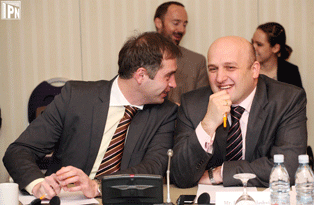Malkhaz Chkadua, Interpressnews
On February 3rd, a round table was held on the issues of media ownership and funding in the Courtyard Marriott. The group of experts and editors who spear-headed the draft law initiative hoped receive concrete answers from the government regarding their remarks and ideas. However, a majority of their questions were left unanswered.
The main concern was the provision of the draft law on media transparency which requests the revealing of media owners’ instead of the financial sources of media-organizations.
Tamar Chergoleishvili, the editor of the magazine Tabula, asked the initiative group members if it gave rise to a polemic among the gathered.
“If we raise the question of financial transparency of media owners then let us investigate the political or financial interest of every journalist, editor or producer and see how far we can go with the request of financial transparency” replied Chergoleishvili.
Media expert Zviad Koridze responded to the corresponding question: “To the question of how far shall we go in the matter of media transparency? I must say – till the end, till the beneficiary? Beneficiaries might often use state budget resources for their activities. Before asking this question we shall underline the main principle – why do we need transparency? Not because TV and radio companies have a big influence on the public, but because they use public funds and are obligated to be transparent.”
Nino Jangirashvili one of the founders of the TV Company Caucasia and the head of its information service further responded to the abovementioned question. According to her, the black holes in the legislation give opportunity to political and business circles to fully manipulate public opinion by using media sources: “Ultimately it was discovered that the state structures and the budget management bodies finance TV companies with millions calling it some kind of support… The state, budget, political and even black market money is flowing to the media and we cannot do anything about it… We do not have the tradition of prohibiting the financing of TV Companies or some concert by City Hall.”
Levan Vepkhvadze, Deputy Speaker of Parliament from the Christian-Democrat Party shared the abovementioned opinion. He supports the draft law on media transparency prepared by the initiative group of experts: “If we compare TV expenses and its income, the difference will be significant. This difference needs to be covered by some means. Apparently, the one who covers these expenses have a big influence on the editorial policy. Such practice has been followed until today. The main goal is to reach editorial independence with more transparency.”
In response to Vepkhvadze’s question, one of the leaders of the Parliamentary majority and the head of the Legal Issue Committee Pavle Kublashvili stated that the existing legislation also ensures the necessity of financial transparency: “We are talking about the finances received by the TV companies, their transparency and provision of correct information. I would like to underscore the fact that there is a provision in the existing legislation that regulates this matter and necessitates presentation of audit material to the Georgian National Communications Commission. This provision establishes the amount of income that should be used for commercial activity and what should be used beyond this income.”
If so, why do we not know about the financing of Rustavi 2 and Imedi? Why their audit evaluations do not contain any figures and why the Georgian National Communication Commission makes one-sentence evaluations stating everything is in order in the financial documents of TV-Companies?
Shorena Shaverdashvili, the editor and publisher of the magazine Liberal, asked these questions. She immediately recalled one fact: “I want to discuss the topic of tax amnesty. 36 million GEL was discharged from TV-Companies – among them are national broadcasting companies – so that we do not know the exact amount of the discharged money or what the government “forgave” them. Here we cannot discuss transparency; it would be nice if we admit that even least amount of transparency is guaranteed by the current legislation.”
The questions were not answered at today’s meeting. The guest of the round table, American expert of media-law Barbara Swan said that media-pluralism is one of the main priorities in the world. We will learn next week whether the government will follow pluralism after the parliament will start a second discussion of the draft-law on the transparency of media-owners.




